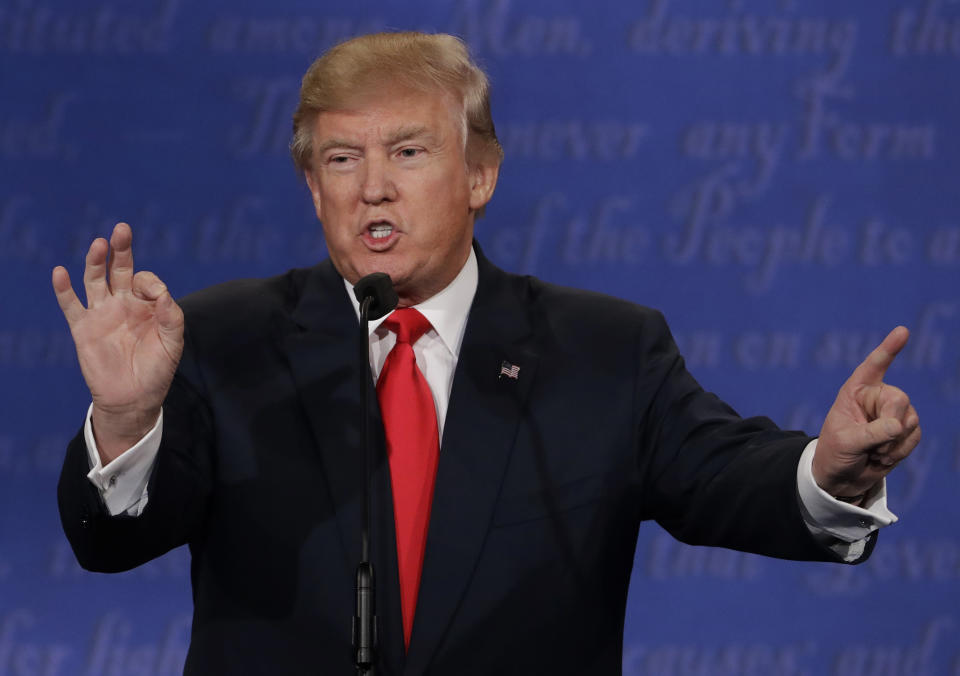Why Trump is bad news for America's freelancers
Working looks less like having a job as more Americans make money not from an employer but from a series of clients or an online platform like Uber or Etsy connecting workers with customers. But you wouldn’t know that from most workplace laws and regulations—or this topic’s absence from mainstream political chatter.
Advocates of what’s been called the gig economy, the flexible economy, the platform economy or the 1099 economy (the number of the tax form reporting “miscellaneous income,” dozens of which I’ve received since I began freelancing full-time in 2011) want to fix that.
But their efforts to give independent workers some of the same benefits as traditional employees come just as the health-insurance market may get upended in ways solo strivers won’t like.
A growing classification concern

The problem starts with current law: If a company treats a worker as if they were a regular employee, that firm must give this person a regular employee’s protections and benefits. The likes of Uber already face lawsuits alleging their regular drivers are the functional equivalent of employees and should be reclassified accordingly.
For a company like Uber to provide health or retirement benefits to its drivers would increase the risk that it has to reclassify them as employees rather than contractors.
“The legal system regards supplying non-cash benefits to workers as evidence of the control and leverage a firm has,” e-mailed Anne Hobson, an analyst with the free-market-minded R Street Institute.
A large fraction of the workforce is at stake. A study released in November by the Pew Research Center found that some 24% of American adults earned money in the “platform economy” over the last year—about 59 million, extrapolating from 2015 Census data. And of those, 29% termed this income “essential” and 27% labeled it “important.”
A report last week by Stanford University business professor Paul Oyer, citing surveys commissioned in 2014 and 2015 by gig-economy platform Upwork and the Freelancers Union (disclosure: I’m a member), estimated that about 50 million Americans work independently.
Those and other studies indicate that while some independent workers also have full- or part-time jobs (44% and 24% in the Pew data), a large share of them had no employer. Thirty-two percent of independent workers in the Pew study put themselves in that basket, as did 44% of respondents to a survey of US and EU indie workers released this year by the McKinsey Global Institute.
What should you get?
Labor unions would solve this by giving most of these contract workers employee status under the law. But while some gig-economy platforms have taken steps in that direction—see, for instance, the grocery-shopping service Instacart—most insist that keeping workers’ contract status preserves their core virtue of flexibility.
That’s something many independent workers prize. Pew reported that 30% of people working on gig-economy platforms cited being able to set their own hours as a core virtue.
“Most of them say I do it because I want to,” Stanford’s Oyer said at a panel in Washington last week hosted by Upwork to discuss his paper. “Flexibility is really the key to this.”
Current law provides some ways for gig-economy types to secure benefits like those regular employees get, but Pew findings suggest they function weakly: 77% of platform workers have health insurance, 10 points below the U.S. average, and 27% have a retirement-savings account, 13 points under average.
Advocates of reform want to see workers get basic, consistent benefits regardless of status—and to which gig-economy platforms can contribute safely. For instance, this 2015 post by a wide group of labor representatives and gig-economy firms urged doing that. At a panel I moderated the day after the election at the Web Summit conference in Lisbon, investor Bradley Tusk and Handy co-founder Oisin Hanrahan made a similar pitch.
R Street’s Hobson suggested a five-year “safe harbor” law lifting the reclassification threat from gig-work platforms contributing to portable benefits. “This would allow platforms to compete to attract workers by providing health, life, disability or accident insurance, expense reimbursement and retirement products,” Hobson said.
Stanford’s Oyer endorsed that idea and also suggested tax reform to clarify retirement-savings choices. “There are lots of good retirement options out there but they are so complicated that people don’t do it,” he wrote in an e-mail.
A new administration brings health-insurance anxiety

This would have been a great subject to debate during the election, but Donald Trump and the Republican party platform barely mentioned the gig economy (though Hillary Clinton did touch on the subject during her campaign).
To be sure, Trump campaigned on sweeping tax-reform provisions that might reward independent workers—one of his proposals would let independent workers file at his lower 15% corporate-tax rate.
But I shouldn’t start spending my future tax savings, as Trump already seems to be backing away from that. Hobson noted that when Kansas tried an even more generous “pass-through” policy, “widespread tax avoidance” resulted.
Trump, however, has promised to abolish the Affordable Care Act, even without a replacement. Under the latest Republican proposals, Congress would set a three-year fuse on “Obamacare” and then figure out what takes its place. The odds of a successor being enacted by 2020 with comparable protection for solo workers seem decidedly iffy, as are the chances of insurers sticking with a health-care regime on death row.
“This is an area we have to start worrying a lot about,” Oyer said at the Washington panel. “I hope that any changes will be keeping independent workers in mind.”
Email Rob at [email protected]; follow him on Twitter at @robpegoraro.

